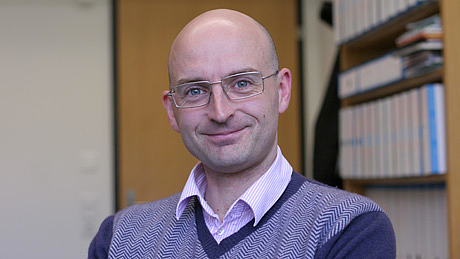Mathematician Camillo De Lellis Appointed to the Faculty of the Institute for Advanced Study
Press Contact

Camillo De Lellis, a world-renowned geometric analyst with broad expertise in the calculus of variations, geometric regularity theory, and fluid dynamics, has been appointed to the Faculty of the School of Mathematics at the Institute for Advanced Study, effective July 1, 2018. De Lellis, currently Professor at Universität Zürich, succeeds Professor Emeritus Thomas Spencer, who has served on the Faculty since 1986.
An original and prolific mathematician, De Lellis has contributed profoundly to central problems of analysis and geometry. His use of modern tools and innovative approaches in examining fundamental questions in the field have resulted in new and monumental insights that have advanced understanding within the mathematical community.
“Camillo is one of today’s leading analysts,” said Helmut Hofer, Professor in the School of Mathematics. “His contributions to major subjects in the field are among the most important achievements in recent times. His scientific leadership, innovative vision, great originality, technical strength, and exceptional expository skills make him an ideal appointment for the School of Mathematics.”
Robbert Dijkgraaf, Director of the Institute and Leon Levy Professor, added, “Camillo is an outstanding mathematician whose deep analytical skills, in combination with his enthusiasm and versatility, will continue to lead the pursuit of the field’s most challenging questions. We are extremely excited to welcome Camillo to the Faculty of the Institute.”
“The Institute’s wonderful environment provides an unrivaled opportunity for collaborating with extraordinary researchers,” said De Lellis of his appointment. “Joining the Faculty of the Institute is both an exceptional honor and a daunting challenge, and I am excited to make my own contributions to such a unique place.”
A distinguished mathematician, De Lellis is well known for his pioneering work on geometric measure theory and, in particular, regularity theory of minimal surfaces. De Lellis, together with collaborator Emanuele Spadaro, ambitiously examined and reopened the work of Frederick J. Almgren, frequent Member in the School of Mathematics, and his 1,000-page proof on partial regularity theory. De Lellis and Spadaro utilized pioneering techniques, coupled with a novel approach, to craft an accessible proof that could be used more widely throughout the field. Their work resulted in a concise, modern version of the theory that not only strengthened Almgren’s original assertion, but also presented many new insights. De Lellis’s remarkable contribution to this fundamental area of mathematics created a transparent proof of regularity and opened new lines of inquiry for geometric analysts to explore.
De Lellis’s work also focuses on nonlinear partial differential equations in differential geometry and the mathematics of turbulent flows in fluid mechanics. De Lellis and his collaborator, László Székelyhidi, Jr., Member (2003–04) in the School of Mathematics, transformed the area through major contributions to the mathematical theory of fluid turbulence, primarily with their work on the Euler equations and Onsager conjecture. Through a series of papers, De Lellis and Székelyhidi developed a new and exciting route to the conjecture by combining Mikhael Gromov’s convex integration theory together with the embedding theorems of John F. Nash, Jr., Member (1956–57, 1961–62, 1963–64) in the School of Mathematics. De Lellis’s remarkable ability to utilize cutting-edge methods to connect seemingly unrelated areas of mathematics resulted in a monumental breakthrough in the field.
De Lellis’s groundbreaking achievements in fluid dynamics and the regularity of minimal surfaces earned him the prestigious Fermat Prize in 2013. His transformative and original work in the field has also resulted in the Stampacchia Gold Medal (2009); the SIAM Activity Group on Analysis of Partial Differential Equations Prize (2013); the Caccioppoli Prize (2014); and the Lucio & Wanda Amerio Gold Medal Prize (2015). He was also an invited speaker at the 2010 International Congress of Mathematicians in Hyderabad, India, and a plenary speaker at the 2012 European Congress of Mathematicians in Kraków, Poland.
De Lellis earned degrees from Scuola Normale Superiore di Pisa and the University of Pisa. He held a postdoctoral position at the Max Planck Institute for Mathematics in the Sciences (2002), followed by a postdoctoral residency at Eidgenössische Technische Hochschule Zürich (2003). De Lellis joined the faculty of Universität Zürich in 2004 as Assistant Professor of Mathematics, and he became Professor in 2005. He is an engaged member of the mathematical community and serves on the editorial boards of many leading publications in the field, including Annals of PDE, the Archive for Rational Mechanics and Analysis, Calculus of Variations and Partial Differential Equations, Inventiones Mathematicae, and the Journal of Differential Geometry.
About the Institute
The Institute for Advanced Study is one of the world’s leading centers for theoretical research and intellectual inquiry. The Institute exists to encourage and support curiosity-driven research in the sciences and humanities—the original, often speculative thinking that produces advances in knowledge that change the way we understand the world. Work at the Institute takes place in four Schools: Historical Studies, Mathematics, Natural Sciences, and Social Science. It provides for the mentoring of scholars by a permanent Faculty, and it ensures the freedom to undertake research that will make significant contributions in any of the broad range of fields in the sciences and humanities studied at the Institute.
The Institute, founded in 1930, is a private, independent academic institution located in Princeton, New Jersey. Its more than 8,000 former Members have held positions of intellectual and scientific leadership throughout the academic world. Thirty-three Nobel Laureates and 41 out of 56 Fields Medalists, as well as many winners of the Wolf and MacArthur prizes, have been affiliated with the Institute.